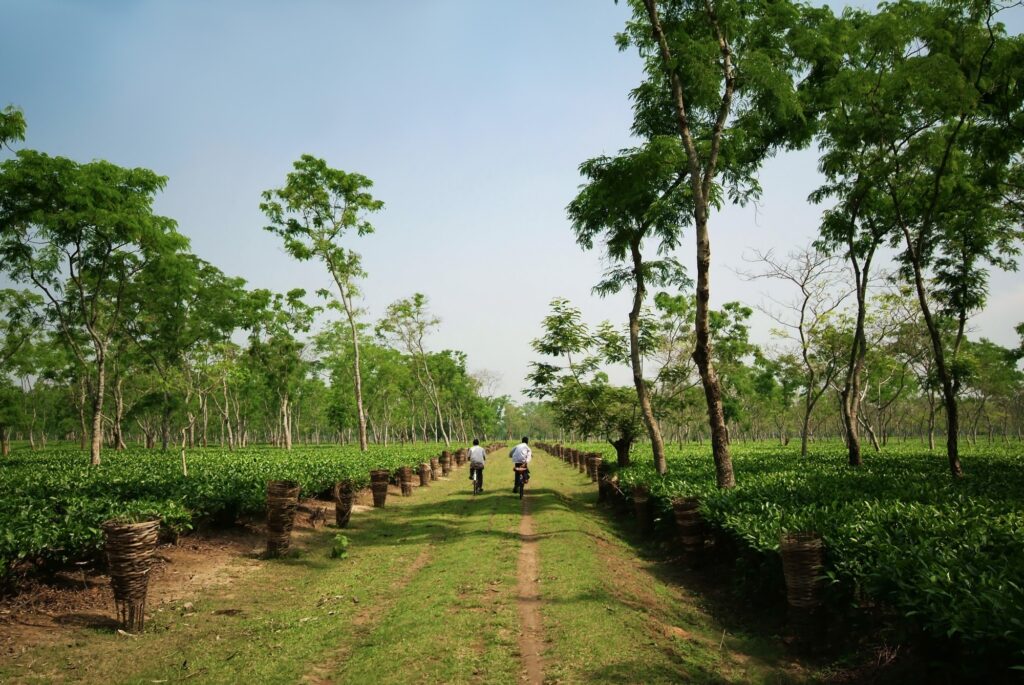
Nestled in the picturesque landscapes of northeastern India, the tea district of Assam stands as a testament to the region’s rich cultural heritage and its profound connection with the revered beverage. This verdant expanse, adorned with undulating tea gardens and misty valleys, has captivated the hearts of connoisseurs and travelers alike, offering a unique blend of aromatic brews and breathtaking scenery.
Assam’s tea district is a tapestry woven with the threads of history, tradition, and nature’s bounty. Here, the art of tea cultivation is not merely an industry but a way of life, passed down through generations of skilled artisans who have mastered the intricate process of transforming delicate tea leaves into exquisite cups of delight.
As you embark on an exploration of this enchanting region, prepare to be immersed in a world where the aroma of freshly plucked leaves mingles with the gentle whispers of the wind, where ancient techniques intertwine with modern innovations, and where every sip unveils a tapestry of flavors that will captivate your senses.
The history and cultural significance of tea in Assam
The story of tea in Assam is an epic tale that spans centuries, intertwined with the region’s rich cultural fabric. It is a narrative that begins with the discovery of the indigenous Camellia sinensis var. assamica, a wild tea plant that grew abundantly in the lush forests of Assam.
In the early 19th century, this remarkable discovery paved the way for the establishment of Assam as a tea-producing region, forever altering the course of history. The British East India Company recognized the potential of this unique tea variety and swiftly established plantations, laying the foundation for what would become a thriving industry.
As the tea trade flourished, it not only shaped the economic landscape of Assam but also influenced its social and cultural fabric. Tea gardens became more than just places of cultivation; they evolved into vibrant communities where traditions were born and cherished. The rhythmic plucking of leaves, the melodic chants of tea workers, and the aroma of freshly brewed cups became intrinsic parts of Assam’s identity.
Today, tea remains a deeply ingrained aspect of Assamese culture, celebrated in festivals, rituals, and daily life. It is a symbol of hospitality, a catalyst for social gatherings, and a source of pride for a region that has mastered the art of crafting exceptional brews.
Assam tea: Characteristics and flavor profiles
Assam tea is renowned for its distinctive characteristics and captivating flavor profiles, setting it apart from other tea varieties. This exceptional brew is crafted from the robust and hardy Camellia sinensis var. assamica plant, which thrives in the region’s tropical climate and fertile soil.
One of the defining traits of Assam tea is its rich, malty flavor profile. The leaves, when expertly processed, yield a deep, full-bodied liquor with notes of malt, earthiness, and a hint of sweetness. This robust character is a result of the region’s unique terroir, which includes factors such as soil composition, rainfall patterns, and temperature variations.
Assam teas are also known for their vibrant, coppery hue, which is a visual delight in the cup. This distinctive color is a result of the high levels of polyphenols and other compounds present in the leaves, contributing to the tea’s robust and complex flavor profile.
Additionally, Assam teas are prized for their exceptional strength and ability to withstand the addition of milk and sugar, making them a popular choice for traditional Indian chai preparations. Whether enjoyed plain or blended with spices and milk, Assam teas offer a truly captivating sensory experience.
Exploring the scenic landscapes of the tea district
The tea district of Assam is not merely a hub for exceptional brews but also a visual feast for the senses. This region is adorned with breathtaking landscapes that seamlessly blend lush tea gardens, rolling hills, and meandering rivers, creating a tapestry of natural beauty that will leave you spellbound.
As you traverse the winding roads that crisscross the tea district, you’ll be greeted by a panorama of emerald-green tea bushes stretching as far as the eye can see. These meticulously manicured gardens, interspersed with vibrant splashes of color from blooming flowers, create a visual symphony that captivates the soul.
Beyond the tea gardens, the region is dotted with picturesque villages, where traditional Assamese architecture and way of life have been preserved for generations. Thatched-roof huts, vibrant markets, and friendly locals offer a glimpse into the region’s rich cultural tapestry, inviting you to immerse yourself in the authentic Assamese experience.
Nature enthusiasts will find solace in the region’s pristine forests, where the melodic calls of exotic birds and the gentle rustling of leaves create a soothing symphony. Meandering rivers and cascading waterfalls add to the natural allure, providing opportunities for scenic hikes, picnics, and peaceful contemplation amidst the tranquility of nature.
Tea gardens and estates in Assam
The tea district of Assam is home to numerous renowned tea gardens and estates, each with its own unique story and legacy. These sprawling plantations are not only centers of tea production but also living museums that showcase the region’s rich heritage and commitment to excellence.
One of the most iconic tea estates in Assam is Hathikuli Tea Estate, established in 1859. This historic garden is renowned for its exceptional quality teas and its commitment to preserving traditional methods of cultivation and processing. Visitors can embark on guided tours, witnessing the intricate steps involved in transforming delicate tea leaves into aromatic brews.
Another notable estate is Maijan Tea Estate, nestled amidst the picturesque Brahmaputra Valley. This garden is celebrated for its organic and sustainable practices, ensuring that every cup of tea is not only delicious but also environmentally responsible. Visitors can engage with knowledgeable guides, learn about the estate’s eco-friendly initiatives, and savor the unique flavors of their award-winning teas.
For those seeking a truly immersive experience, Thengal Manor and Gatoonga Tea Estate offer the opportunity to stay amidst the lush tea gardens. These heritage bungalows, steeped in colonial charm, provide a glimpse into the region’s storied past while allowing guests to indulge in the tranquility of their surroundings and savor the finest Assam teas.
The process of tea production in Assam
The art of tea production in Assam is a meticulous process that has been perfected over generations, combining traditional techniques with modern innovations. From the careful plucking of the delicate leaves to the intricate steps of processing, each stage is a testament to the region’s commitment to quality and authenticity.
- Plucking: The journey begins with the skilled hands of the tea pluckers, who meticulously select the tender leaves and buds from the tea bushes. This labor-intensive process is often carried out by women, who have honed their skills through years of experience and passed down their knowledge from generation to generation.
- Withering: Once plucked, the leaves undergo a crucial step called withering, where they are spread out in well-ventilated rooms to allow for controlled moisture loss. This process not only prepares the leaves for further processing but also initiates the chemical reactions that contribute to the tea’s unique flavor and aroma.
- Rolling and Oxidation: The withered leaves are then rolled, either by hand or using specialized machinery, to initiate the oxidation process. This step is crucial in developing the tea’s characteristic flavor and color, as the rolling action breaks down the leaf cells and exposes them to oxygen.
- Drying and Sorting: After oxidation, the leaves are carefully dried to halt the oxidation process and preserve the desired flavor profile. This step is often carried out using specialized drying machines or, in some cases, traditional wood-fired ovens. Once dried, the tea leaves are meticulously sorted and graded based on their size, quality, and intended use.
- Packaging and Shipping: The final step in the process is the careful packaging and shipping of the tea to ensure its freshness and quality. Many Assam tea estates take great pride in their packaging, often incorporating traditional designs and motifs that reflect the region’s rich cultural heritage.
Throughout this intricate process, the skilled artisans of Assam infuse their passion and expertise into every cup, ensuring that each sip is a celebration of the region’s tea heritage.
Assam’s famous tea festivals and events
Assam’s love for tea extends beyond the boundaries of its tea gardens and estates, manifesting in a vibrant tapestry of festivals and events that celebrate the region’s tea heritage. These gatherings not only showcase the finest brews but also provide a platform for cultural exchange, fostering a deeper appreciation for the art of tea cultivation and consumption.
One of the most renowned tea festivals in Assam is the Mriganayan Tea Festival, held annually in the picturesque town of Mriganayan. This two-day extravaganza is a celebration of the region’s tea culture, featuring exhibitions, workshops, and live demonstrations showcasing the various stages of tea production. Visitors can indulge in tea tastings, witness traditional dance performances, and immerse themselves in the vibrant local markets.
Another notable event is the Assam Tea Festival, held in the state capital of Guwahati. This grand celebration brings together tea growers, producers, and enthusiasts from across the region and beyond. Visitors can explore a vast array of stalls showcasing the finest Assam teas, attend informative seminars, and participate in interactive workshops to deepen their understanding of this revered beverage.
For those seeking a more intimate and immersive experience, the Tea Trail Festival offers a unique opportunity to explore the tea gardens and estates of Assam. This multi-day event takes participants on a curated journey, allowing them to witness firsthand the intricate processes involved in tea production, interact with local artisans, and savor the flavors of freshly brewed Assam teas amidst the serene landscapes.
Tea tourism in the tea district of Assam
The tea district of Assam has emerged as a sought-after destination for tea tourism, attracting connoisseurs, travelers, and nature enthusiasts alike. This unique form of tourism offers an immersive experience, allowing visitors to delve into the rich tapestry of Assam’s tea heritage while exploring the region’s breathtaking natural beauty.
One of the highlights of tea tourism in Assam is the opportunity to stay at heritage bungalows or tea estate resorts. These charming accommodations, often nestled amidst lush tea gardens, provide a glimpse into the region’s colonial past while offering modern amenities and unparalleled hospitality. Guests can wake up to the aroma of freshly brewed Assam tea, indulge in traditional Assamese cuisine, and embark on guided tours of the surrounding tea estates.
Tea tourism also offers a chance to participate in immersive experiences, such as tea plucking workshops, where visitors can learn the art of selecting the finest leaves and buds from the tea bushes. Tea tasting sessions, led by knowledgeable experts, provide an opportunity to savor the nuances of different Assam tea varieties and gain a deeper appreciation for their distinct flavor profiles.
For those seeking adventure, Assam’s tea district offers a plethora of outdoor activities, including hiking trails that wind through verdant tea gardens, river rafting expeditions along the region’s scenic waterways, and bird-watching excursions in the nearby forests. These experiences allow visitors to connect with nature while gaining insights into the region’s rich biodiversity and cultural heritage.
Sampling the finest Assam teas
No exploration of the tea district of Assam would be complete without indulging in the region’s finest brews. From the robust and malty Orthodox Assam teas to the delicate and aromatic Specialty Assam teas, this region offers a diverse array of flavors to tantalize the palate of even the most discerning tea connoisseur.
One of the most iconic Assam teas is the Assam Black Tea, renowned for its rich, full-bodied character and deep, malty notes. This tea is often used as a base for traditional Indian chai preparations, lending its robust flavor to the spiced and milk-infused concoctions.
For those seeking a more delicate and nuanced experience, the Assam White Tea is a true gem. Crafted from the young, tender buds of the tea plant, this rare and precious brew offers a delicate, floral aroma and a subtly sweet, mildly astringent flavor profile.
Assam’s Green Teas are also gaining recognition among tea enthusiasts, offering a refreshing and invigorating experience. These teas are characterized by their vibrant, grassy notes and a delicate, slightly vegetal flavor profile, making them a perfect choice for those seeking a revitalizing and healthful beverage.
No matter your preference, the tea district of Assam offers a rich tapestry of flavors to explore, each cup a testament to the region’s commitment to quality, tradition, and the art of crafting exceptional brews.Immerse yourself in the rich heritage of Assam’s tea district by booking a tea tour or staying at one of the region’s heritage bungalows or tea estate resorts. Indulge in the finest Assam teas, witness the intricate processes of tea production, and explore the breathtaking landscapes that have captivated tea connoisseurs and travelers alike. Embrace the timeless allure of Assam’s tea culture and create memories that will linger long after your visit.
Embracing the tea heritage of Assam
The tea district of Assam is a captivating tapestry woven with the threads of history, tradition, and nature’s bounty. From the lush tea gardens that stretch across rolling hills to the serene landscapes adorned with misty valleys and meandering rivers, this region offers a truly immersive experience for those seeking to embrace the rich heritage of tea cultivation.
As you explore the tea district, you’ll be enchanted by the aroma of freshly plucked leaves, the rhythmic chants of tea workers, and the vibrant tapestry of cultural traditions that have been passed down through generations. Each sip of Assam tea will transport you on a journey through time, unveiling the region’s storied past and its unwavering commitment to quality and authenticity.
Whether you’re a passionate tea connoisseur, a nature enthusiast, or a cultural explorer, the tea district of Assam promises an unforgettable experience that will leave an indelible mark on your senses and your soul. Embrace the allure of this enchanting region, savor the flavors of its finest brews, and immerse yourself in a world where tea is not just a beverage but a way of life, a celebration of nature’s bounty, and a testament to the enduring spirit of a people who have mastered the art of crafting exceptional cups of delight.






